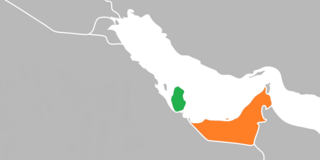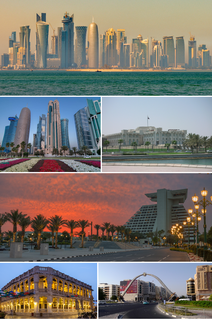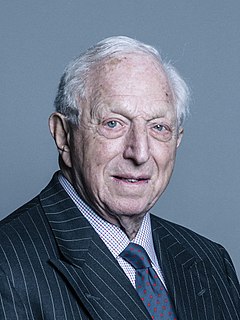
The political system of Qatar is either an absolute monarchy or a constitutional monarchy, with the Emir of Qatar as head of state and head of government. Under the 2003 constitutional referendum it should be a constitutional monarchy. Sharia law is the main source of Qatari legislation. according to Qatar's Constitution.

Sheikh Hamad bin Khalifa bin Hamad bin Abdullah bin Jassim bin Mohammed Al Thani is a member of the ruling Al Thani Qatari royal family. He was the ruling Emir of Qatar from 1995 to 2013. The Qatari government now refers to him as His Highness the Father Emir.
Abdullah bin Khalifa Al Thani was Prime Minister of Qatar from 29 October 1996 to 3 April 2007. He served as an advisor to the Emir and often represented him at ceremonial events and receptions.

Sheikh Tamim bin Hamad Al Thani is the current Emir of Qatar. He is the fourth son of the previous Emir, Hamad bin Khalifa Al Thani. Tamim has held a variety of government posts within Qatar and also worked to promote numerous sporting events within the country. As of 2018, Tamim is the youngest reigning monarch among the GCC countries and the youngest current sovereign worldwide.
Abdullah bin Khalid was the former minister of interior of Qatar. He is a member of the House of Al Thani. He is the brother of Sheik Hamad bin Khalid Al Thani. Abdullah bin Khalid is also the former Qatari Minister of Islamic Affairs and Endowments.

Sheikh Hamad bin Jassim bin Jaber bin Mohammed bin Thani Al Thani is a Qatari politician. He was the Prime Minister of Qatar from 3 April 2007 to 26 June 2013, and foreign minister from 11 January 1992 to 26 June 2013.
Abdullah bin Jassim bin Mohammed Al Thani, also known as Sheikh Abdullah bin Jassim Al Thani or Sheikh Abdullah bin Qassim Al Thani, was the Emir of Qatar. He was born in 1880 in Doha, the capital city and state of Qatar. He then abdicated in favour of his heir apparent and second son, Sheikh Hamad bin Abdullah Al Thani, in 1940. Sheikh Hamad died eight years later and Sheikh Abdullah assumed office once again until 1949, when he stepped down from office in favour for his eldest son, Sheikh Ali bin Abdullah Al Thani. Oil was also discovered for the first time during his rule.
Sheikh Hamad bin Suhaim bin Hamad bin Abdullah bin Jassim bin Muhammed Al Thani, is a former government minister of Qatar. He is the son of Sheikh Suhaim bin Hamad Al Thani, the granduncle of the current Emir of Qatar, Tamim bin Hamad Al Thani.

Qatar–United Arab Emirates relations are the relations between Qatar and the United Arab Emirates (UAE). The relationship between the two countries has been severed following the 2017–19 Qatar diplomatic crisis.

The Ministry of Foreign Affairs is the ministry responsible for handling Qatar's external relations and diplomatic efforts, including the maintenance of its diplomatic missions across the globe. The current minister is Mohammed bin Abdulrahman Al Thani.

Khalid bin Mohammad Al Attiyah is a Qatari politician who was Minister of Foreign Affairs of Qatar from June 2013 to January 2016. He has been Minister of State for Defense since January 2016.

Mohammed bin Abdulrahman bin Jassim Al Thani is a member of Al Thani family, and has been the Deputy Prime Minister and Qatari Minister of Foreign Affairs since 27 January 2016.

Mexico–Qatar relations refers to the diplomatic relations between the United Mexican States and the State of Qatar.

Sheikh Thani bin Hamad bin Khalifa Al-Thani is the brother of the Emir of Qatar Tamim bin Hamad Al Thani, and son of the country's Father Emir Hamad bin Khalifa Al Thani. Al-Thani sits on the board of directors of the Doha Film Institute and International Bank of Qatar.
Kazakhstan – Qatar relations are the bilateral relations between the Republic of Kazakhstan and the State of Qatar. Diplomatic relations were established in 1993. Kazakhstan has an embassy in Doha. Qatar also has an embassy Astana.

Brazil – Qatar relations are the bilateral relations between the Federative Republic of Brazil and the State of Qatar. Diplomatic relations were formed in 1974. Brazil has an embassy in Qatar's capital Doha. Qatar also has an embassy in the Brazilian capital of Brasília.

China – Qatar relations are the bilateral relations between the People's Republic of China and the State of Qatar. China has an embassy in Doha, while Qatar has an embassy in Beijing. With diplomatic relations first being formed in 1988, Qatar is currently a strategic ally of China, with relationship between the two countries growing stronger.















